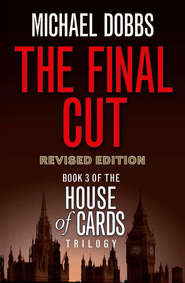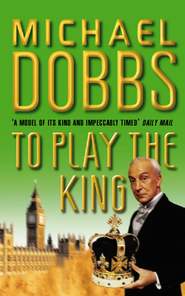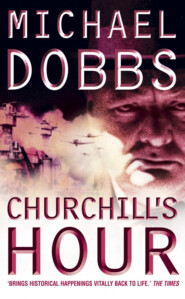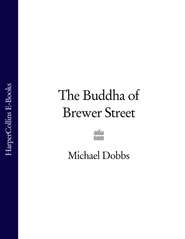По всем вопросам обращайтесь на: info@litportal.ru
(©) 2003-2024.
✖
Winston’s War
Настройки чтения
Размер шрифта
Высота строк
Поля
The entrance to Shepherd Market stood just across from Trumper’s. It was a maze of alleyways and small courtyards hidden in the heart of Mayfair. Here a hungry man could stumble upon a startling variety of pubs and restaurants, mostly of foreign origin, and if he stumbled on a little further he could find narrow staircases that led to rooms where he might satisfy many of his other cravings, too.
When Mac arrived Burgess was standing at the bar of the Grapes, as he had said he would be. He was smoking, cupping the cigarette in the palm of his hand, and drinking a large Irish whiskey. The barber levered himself up onto a bar stool. Mac was short, wiry, his shoulders unevenly sloped as though to compensate for his crooked leg, with a back that was already bent, perhaps through stooping over his customers. The greying hair was scraped neatly but thinly across the skull, the skin beneath his mouth was wrinkled, as though the chin had tried to withdraw and seek refuge from the blows. He was not yet forty but looked considerably older.
‘I thought maybe you wouldn’t come,’ Burgess offered, but didn’t extend a hand. The English never did.
‘I thought so too. Particularly when I saw you drinking in the saloon bar. Bit rich for me.’
‘It’s on me. What’s your poison?’
‘I’d be thankful for a pint of mild, Mr Burgess.’
Burgess noted the obsequious ‘sir’ had gone. This was a meeting of equals. Burgess took out a large roll of notes from his pocket and paid for a glass of flat brown liquid. ‘You couldn’t get that in the gulag, could you, McFadden?’
‘We got many things. Brutality and starvation mostly. But there was always plenty of work to fill idle moments.’ He drank deep, wiping his mouth with the back of his hand. An old scar ran across the hand, dulled by time, and he had a crooked finger that had clearly been broken and badly set.
‘How did you end up in Solovetsky?’
‘Who can tell any more? Through a series of other camps, moved from one to another, forgotten about, rediscovered, moved on. I wasn’t a criminal, just unfortunate. That was the problem. You see, they’d completely forgotten why I was there, so they couldn’t release me, could they? Not without the proper paperwork. If they’d let me free and made a mistake, they would end up serving the sentence for me. Such things have to be handled correctly. So they kept me, just in case. The only reason I can recall Solovetsky above the many others is because of this.’ He indicated his leg.
‘How’d it happen?’
‘We were building a new dock. It was February, I think. Winter in the Arctic Circle. We hadn’t seen the sun for weeks. I was ordered to unload a wagon full of heavy timbers. In the dark and the cold, they fell on me.’
‘I thought you said it wasn’t an accident.’
Their eyes met once more, almost as combatants. ‘When it’s thirty degrees below, you’ve already worked nine hours without food, you can’t feel your feet or your hands and the entire pile of logs has frozen solid, you’ve been beaten twice by the guards that day because the work detail hasn’t completed its quota, and they threaten they’ll go on beating you until the timbers are unloaded – I don’t call that much of an accident. Do you, Mr Burgess?’
‘You must hate the Russians.’
‘Why should I? Most of my fellow prisoners were Russians.’
‘The Soviets, the guards, then.’
‘Not especially. They simply took over the camps that had been built by the Tsars and didn’t know any different. And it was a Soviet doctor who in the end saved my life. I was one of the lucky ones, Mr Burgess. At the start of the war I was one of many friends, yet today I am the only survivor. They all died, every one of them. That wasn’t the Bolsheviks’ fault. Except for little Moniek, perhaps.’
Burgess offered another drink but Mac was still less than halfway through his pint and declined. Burgess ordered another large Jameson’s. ‘So whose fault was it?’
‘The System.’
‘What system?’
‘Any System. Happens everywhere. Politicians and rulers who decide, who decree, and who leave ordinary folk like me to pay for their mistakes. At least one thing about the Russian Revolution, Mr Burgess, is that when they shot the Tsar at last they got someone to pay for their own mistakes. It’s progress of sorts, I suppose.’
It seemed an excellent time to start playing the game. ‘In a way that’s why I wanted to see you, McFadden. The System. To ask for your help. Do you know I work for the BBC?’
‘No, Mr Burgess, I didn’t. I know quite a lot about you, but not that.’
‘What the hell do you know about me?’
‘That your job involves a deal of writing – judging by the ink smudges on your fingers and the stain on your jacket pocket. It also involves you in a lot of stress – look at your fingernails. And I know you’re not married. Nor ever likely to be.’
‘What?’ Burgess muttered in some alarm.
‘An observant barber knows a very great deal about his clients. That collar of yours, for instance. Hasn’t ever been near a woman. And if the rest of your wardrobe is like that, you stand about as much chance of getting a woman as Stalin has of becoming Pope. You’re an intelligent man, you must see that, yet it doesn’t seem to worry you. So I conclude you’re not a ladies’ man at all.’
‘You think I’m trying to pick you up?’
Mac smiled gently. ‘No. With the sort of money you just pulled out of your pocket there’d be no need for you to bother with the likes of me. Anyhow, in my experience you gentlemen are perceptive types – is that the right word? You would know from the start that you were wasting your time. You and me, we worship in different churches. But I don’t rush to judgements, Mr Burgess, not at all. In the camps, you see, you learned to survive by any means that were necessary. Any means, Mr Burgess, whatever it took. You did, or you died. You understand me?’
‘I think so.’
‘Not places for moralizing, the camps. So I don’t moralize, not even about my customers.’ Mac was enjoying himself. He was in control, had the upper hand, so different from being on the end of a boot. That was why he’d agreed to a drink. He’d seen in Burgess someone who was suffering more than he was, and had come out of curiosity.
‘So we have established that you’re not after my body, Mr Burgess. Then what do you want?’
‘Proper bloody Sherlock Holmes, aren’t we?’ Burgess snapped, but smiling, offering a compliment and at last persuading his guest to accept another drink.
‘Understand, Mr Burgess, the best time to get to know a man is when you’re polishing his boots – or cutting his hair. That way you get to see all of him, from top to toe. Trouble with most English gentlemen – if I may venture an opinion, Mr Burgess? – is that they never take the time to get to know another man. It’s a class thing. An Englishman only ever looks up – and usually up someone else’s backside.’
‘You don’t like the English?’
‘A certain type of Englishman. I’ve got customers whose hair I’ve cut for years and still they have to ask my name every time they come in. You knew it – wanted to know it – right from the start. Doesn’t matter why, it was enough you took an interest, didn’t patronize me. So I thought I’d take an interest, too. How can I help?’
Burgess knocked back his refreshed drink in one draught. ‘Not sure you can, really, but … I work for the BBC. Political programmes. I like the job, it’s important – more important than ever right now – yet it’s like driving in a fog. The Government tells us next to nothing and what it does say is twisted like a corkscrew. Or it lies, promises peace in our time, yet we’re going to war whether we like it or not.’
The barber’s deep-set eyes held his own, steady, not agreeing, not dissenting either.
‘So I need to understand. If we’re going to war I want to know the bloody reason why. And as I was sitting in your chair it struck me – the people you see every day are the ones who make these decisions. And they talk to you. If you could help me understand what they’re thinking, what they’re planning, I’d be able to do my job a hell of a lot better.’
‘Mr Burgess, I cut the hair of politicians, Cabinet Ministers, all sorts of great men. They entrust me with their confidences because they think I’m slow and stupid and working-class and a little foreign, so they assume I couldn’t possibly understand. And you want me to pass those confidences on to you.’
Damn it, but this man knew what he was about. ‘I’m not asking you to divulge secrets or anything …’
‘I have secrets, Mr Burgess? If they tell me, a mere barber, how could they be secrets?’
‘I’m sorry, if you find this offensive I’ll go …’
Mac was sipping his beer, contemplating. Slowly, gulp by gulp, he drained his glass and gently replaced it on the polished counter. ‘Offensive? Mr Burgess, I don’t find you trying to do your job offensive. I find the gulags offensive, yet what’s going on in Europe right now is going to lead to far, far worse than the gulags. I find that offensive. There’s something else. Just this morning I was reading in the newspaper – it was left behind by a gentleman, he’d only been interested in Court Circular and the horseracing news. It was buried inside, a little report. Not of much consequence, apparently. About how in Vienna they were celebrating Mr Hitler’s victory in Czechoslovakia by rounding up Jews. They dragged entire families from their houses and made the old ladies sit up in the branches of trees like birds, all night long. It snows sometimes in Vienna at this time of year, Mr Burgess. And they lined up old men in front of their daughters in the street and shaved their private parts, saying it was a delousing programme. Humiliated them, not because they’d done anything wrong, but because of what they were. Then they were told they couldn’t go back to their houses, that their homes had been confiscated. If anyone objected, they were told they’d be sent to Dachau. Or worse. An interesting choice of phrase – Dachau or worse. What do you suppose they meant by that. Mr Burgess?’
‘Truly, I hate to think.’
‘But somebody has to think, Mr Burgess. And it’s as plain as a maggot in a slice of meat loaf that Mr Chamberlain’s not going to think about all that.’
‘You’re Jewish?’
McFadden shook his head, as though trying to shake off an annoying fly. ‘Doesn’t matter what I am. Or what you are.’
‘Meaning?’











